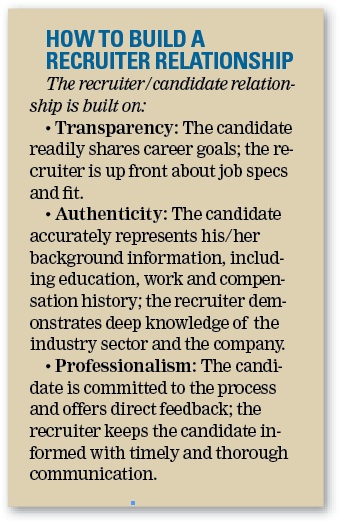There’s an old baseball axiom that “You can never have enough pitching.” Every year, managers deal with pitchers who underperform, suffer injuries or become fatigued during the long season. As a result, teams invest heavily in scouting, farm system development and/or free agency to upgrade and replenish their pitching staffs.
Similarly, hiring managers in the sports industry continually seek top talent and pay a premium to acquire it. Many corporations, in fact, use their own version of scouts — that is, executive recruiters — to help with personnel and leadership challenges.
Recently, I spoke with several top executive recruiters, from both multinational and boutique recruiting firms, to gain insights into their matchmaking role.
■ The role and purpose of recruiters
Often misunderstood in what they do and who they work for, recruiters have direct access to jobs and industry information and shape critical personnel decisions for companies. The best have deep knowledge within specific industry sectors and possess a widespread network that extends far beyond the average bear’s contact list. Recruiters are paid by companies to find personnel solutions, and their results are in plain sight: placed executives who have made a significant contribution over a sustained period of time.
Simply put, recruiters find people for jobs, not jobs for people. There are a few business models in executive recruiting, and it’s important for job candidates to understand their nuances:
• Retained agencies focus on mid- to C-suite searches. In general, these firms have long-term relationships and are viewed as trusted confidants. They are paid a fee, or at least a portion of it, whether the search is successful or not.
• Contingency firms, historically, handle low- to mid-level opportunities and are only paid on success. They identify as many candidates as possible and often have a closer relationship with candidates than with hiring firms.
• Internal recruiters typically work within an organization’s human resources department. In general, their network is not as deep as a retained or contingency firm.
Just like professional scouts, top recruiters are typically out of their offices, networking at events and conferences, working the phones, and meeting potential candidates daily to identify the best available talent.
■ What recruiters are seeking
Recruiters tend to pursue passive (employed and not looking) candidates, because clients view employed individuals more favorably than unemployed ones. Connecting with a recruiter happens through phone, email and, preferably, via viral marketing, where recruiters tend to be proactive based on qualified referrals. All of this occurs long before a face-to-face meeting.
Recruiters are intrigued by a story of progression, where action words (e.g. revenue generator, new business developer, etc.) are supported by tangible accomplishments (i.e. proven facts and figures) and corroborated with shared network connections.
Appealing to a recruiter is no different than creating a bond with any other professional colleague. It’s about cultivating a genuine two-way relationship based not just on need, but also on respect.
Here are a few tips that “scouts” have offered to help facilitate a positive, symbiotic partnership:
• Develop an enthusiastic phone presence, which is typically your first impression for recruiters.
• Spend 95 percent of your career management time on industry networking. Leave the other 5 percent for building recruiter rapport.
• Don’t take anything personally. Maintain your recruiter relationship, whether you’ve landed a job or were passed over.
• Be proactive, prepared and patient. Don’t stalk recruiters, but check in every four to eight weeks and offer fresh market information when possible.
• Prepare personal references carefully, as they add context to your résumé. Tell your references to expect calls. They should know why one’s interested, be aware of any issues with the opportunity, and be prepared for behavioral questions on how you deal with successes and challenges.
■ Communications and questions
One of the common complaints heard about recruiters is that many don’t return calls or emails. For recruiters, time is money, and money is made by matches. Some just don’t see the value proposition to invest in a response.
That said, the vast majority of recruiters to whom I talked indicate that it’s critical to return all outreaches, even if it’s short or delayed. They emphasized that they’re in the people business and never know when a diamond in the rough might sparkle.
There are key questions you should ask a recruiter early on about any potential position.
• What is the history of the position and turnover at the company?
• What is the salary range and career path?
• Does the hiring manager have a positive track record in developing and promoting talent?
• How would you characterize the employer’s culture?
• What’s the greatest risk with this opportunity?
If a recruiter struggles to answer any one of the questions, you should proceed with caution. It could be a sign of potential problems down the road. At the very least, it’s a true indicator of the strength of the client/recruiter relationship.
It’s important not to view a recruiter as your friend or social therapist. You should share information with the recruiter as you would with a potential boss. As candidates age, they will build rapport with a few trusted recruiters and will likely disclose closely held career and life management thoughts as the relationship evolves.
Recruiters can be valuable resources for advancing your career, but they work for the hiring company, not for you. Invest time and effort in exploring how they can be your personal talent scout at the right time and place in your career.
Glenn Horine (ghorine@handhconsulting.net) is the executive director of Iona College’s Center for Sports and Entertainment Studies, a business development consultant and an industry career counselor/lecturer.





